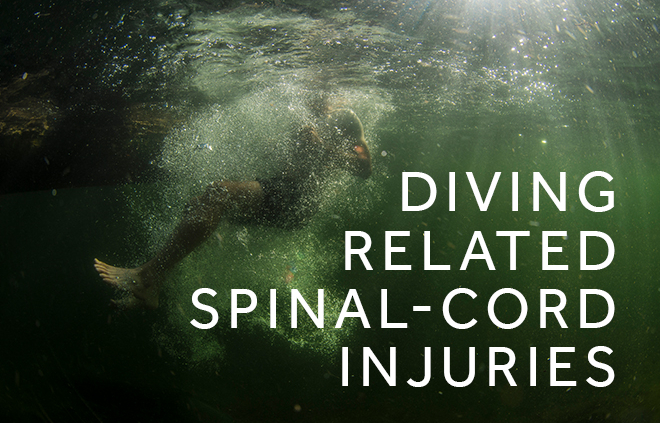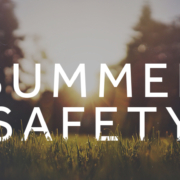Diving Related Spinal-Cord Injuries
As the sun begins to beat heavily down during the summer, people start turning to the relief of cool swimming pools and refreshing lakes for recreation. During the summer months, carefree attitudes coupled with the increasing need to stay cool contribute to a major spike in diving-related SCIs. In a study highlighted by the NCBI, 88% of diving-related cervical spine injuries examined occurred in the summertime, and 97% were sustained by healthy young men (under the age of 27).
Cervical Spine Injuries
The cervical section of the spine is comprised of seven vertebrae that connect the base of the head to the trunk and shoulders… making the informal term for a cervical spine injury a “broken neck.” The results of these injuries can be devastating. Spinal cord damage can cause partial paralysis, complete paralysis, and death.
Diving Hazards
Shallow water: Water depth can be deceptive. Blindly diving into water that has not been previously examined can result in the diver striking the bottom head-first, causing great damage to the vertebrae. Above-ground, personal pools are notoriously shallow and known for causing many a diving accident.
Obstructions in lakes, rivers, and ponds: Natural bodies of water are rarely crystal clear, and are extremely susceptible to debris accumulation. Tree trunks, rocks, and man-made items such as tires are commonly found under the water, but seldom seen above it.
Natural landscape changes: While the ocean may seem like a wide, open opportunity for diving, the fact is that it can be just as hazardous as a murky pond. The ever-changing tide and forceful waves are capable of shifting the layout of ocean sands, causing sandbars to crop up where they previously weren’t. Diving head-first into solid sand can yield traumatic results similar to that of diving into solid concrete.
Staying Safe
Explore and examine: Never dive blindly into any body of water… be it pond, ocean, lake, or swimming pool. Hazards may be lurking beneath the surface, or the designated diving section might be smaller than you anticipated.
Avoid alcohol: Summer often brings with it carefree attitudes and rowdy get-togethers where alcohol is commonly involved. Diving hazards are to be taken seriously, and substances like alcohol often remove the ability to discern the difference between safety and recklessness.
Own responsibly: If you own a personal pool, you are responsible for the safety of the people using it. Ensure that depths are marked properly and that safety rules are clearly stated and posted.
Educate: Water-safety should be included in any child’s education, and diving is a topic that should not be neglected. Make it a point to teach children of possible diving hazards as well as the serious consequences of ignoring safety. Be repetitive and firm in your instruction.
Enjoy the Summer Responsibly
A commonality in diving-related injuries is that they are often suffered by young people who are otherwise strong and healthy. A vibrant future can be altered dramatically by one single dive. Equipping yourself with knowledge and awareness can ensure that you spend your summer enjoying yourself rather than spending it in recovery.
Sources:
http://www.ncbi.nlm.nih.gov/pmc/articles/PMC2899837/
http://www.shepherd.org/resources/injuryprevention/diving
http://www.nature.com/sc/journal/v43/n2/full/3101695a.html
http://www.anationinmotion.org/ortho-pinion/think-twice-before-you-dive/






Leave a Reply
Want to join the discussion?Feel free to contribute!